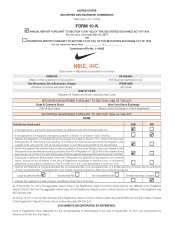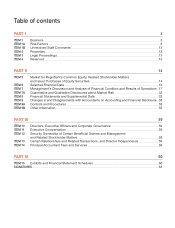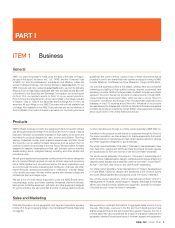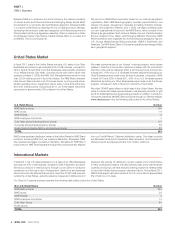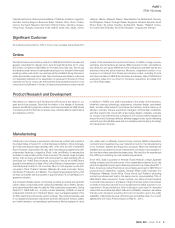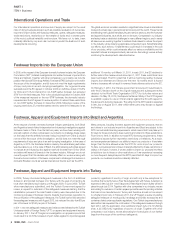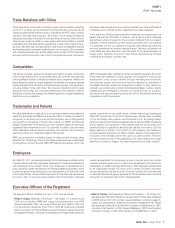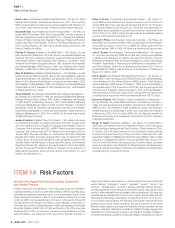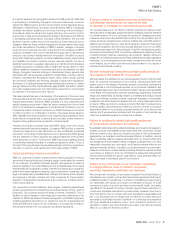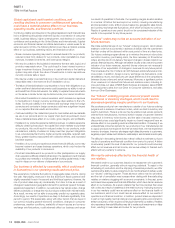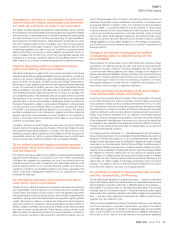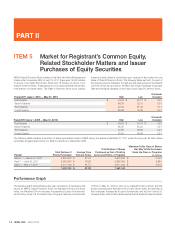Nike 2011 Annual Report Download - page 11
Download and view the complete annual report
Please find page 11 of the 2011 Nike annual report below. You can navigate through the pages in the report by either clicking on the pages listed below, or by using the keyword search tool below to find specific information within the annual report.11NIKE,INC.-Form10-K
PARTI
ITEM1ARisk Factors
Consolidation of retailers or concentration of retail market
share among a few retailers may increase and concentrate
our credit risk, and impair our ability to sell our products.
The athletic footwear, apparel, and equipment retail markets in some countries
are dominated by a few large athletic footwear, apparel, and equipment retailers
with many stores. These retailers have in the past increased their market share
and may continue to do so in the future by expanding through acquisitions
and construction of additional stores. These situations concentrate our credit
risk with a relatively small number of retailers, and, if any of these retailers
were to experience a shortage of liquidity, it would increase the risk that their
outstanding payables to us may not be paid. In addition, increasing market
share concentration among one or a few retailers in a particular country or
region increases the risk that if any one of them substantially reduces their
purchases of our products, we may be unable to fi nd a suffi cient number of other
retail outlets for our products to sustain the same level of sales and revenues.
Failure to adequately protect our intellectual property
rights could adversely affect our business.
We utilize trademarks on nearly all of our products and believe that having
distinctive marks that are readily identifi able is an important factor in creating a
market for our goods, in identifying us, and in distinguishing our goods from the
goods of others. We consider our NIKE
®
and Swoosh Design
®
trademarks to
be among our most valuable assets and we have registered these trademarks
in over 150 countries. In addition, we own many other trademarks that we
utilize in marketing our products. We believe that our trademarks, patents, and
other intellectual property rights are important to our brand, our success, and
our competitive position. We periodically discover products that are counterfeit
reproductions of our products or that otherwise infringe on our intellectual
property rights. If we are unsuccessful in challenging a party’s products on
the basis of trademark or design or utility patent infringement, continued sales
of these products could adversely affect our sales and our brand and result
in the shift of consumer preference away from our products. The actions
we take to establish and protect trademarks, patents, and other intellectual
property rights may not be adequate to prevent imitation of our products by
others or to prevent others from seeking to block sales of our products as
violations of proprietary rights.
In addition, the laws of certain foreign countries may not protect intellectual
property rights to the same extent as the laws of the UnitedStates. We may
face signifi cant expenses and liability in connection with the protection of our
intellectual property rights outside the UnitedStates, and if we are unable to
successfully protect our rights or resolve intellectual property confl icts with
others, our business or fi nancial condition may be adversely affected.
We are subject to periodic litigation and other regulatory
proceedings, which could result in unexpected expense of
time and resources.
From time to time we are called upon to defend ourselves against lawsuits and
regulatory actions relating to our business. Due to the inherent uncertainties
of litigation and regulatory proceedings, we cannot accurately predict the
ultimate outcome of any such proceedings. An unfavorable outcome could
have an adverse impact on our business, fi nancial condition and results of
operations. In addition, any signifi cant litigation in the future, regardless of its
merits, could divert management’s attention from our operations and result
in substantial legal fees.
Our international operations involve inherent risks which
could result in harm to our business.
Virtually all of our athletic footwear and apparel is manufactured outside of
the UnitedStates, and the majority of our products are sold outside of the
UnitedStates. Accordingly, we are subject to the risks generally associated
with global trade and doing business abroad, which include foreign laws and
regulations, varying consumer preferences across geographic regions, political
unrest, disruptions or delays in cross-border shipments, and changes in
economic conditions in countries in which we manufacture or sell products. In
addition, disease outbreaks, terrorist acts and military confl ict have increased
the risks of doing business abroad. These factors, among others, could
affect our ability to manufacture products or procure materials, our ability to
import products, our ability to sell products in international markets, and our
cost of doing business. If any of these or other factors make the conduct of
business in a particular country undesirable or impractical, our business could
be adversely affected. In addition, many of our imported products are subject
to duties, tariffs, or quotas that affect the cost and quantity of various types
of goods imported into the UnitedStates and other countries. Any country
in which our products are produced or sold may eliminate, adjust or impose
new quotas, duties, tariffs, safeguard measures, anti-dumping duties, cargo
restrictions to prevent terrorism, restrictions on the transfer of currency, climate
change legislation, product safety regulations or other charges or restrictions,
any of which could have an adverse effect on our results of operations and
fi nancial condition.
Changes in tax laws and unanticipated tax liabilities
could adversely affect our effective income tax rate
andprofi tability.
We are subject to income taxes in the UnitedStates and numerous foreign
jurisdictions. Our effective income tax rate in the future could be adversely
affected by a number of factors, including: changes in the mix of earnings
in countries with differing statutory tax rates, changes in the valuation of
deferred tax assets and liabilities, changes in tax laws, the outcome of income
tax audits in various jurisdictions around the world, and any repatriation of
non-US earnings for which we have not previously provided for U.S. taxes.
Weregularly assess all of these matters to determine the adequacy of our
tax provision, which is subject to signifi cant discretion.
Currency exchange rate fl uctuations could result in higher
costs and decreased margins and earnings.
A majority of our products are sold outside of the UnitedStates. As a result,
we conduct transactions in various currencies, which increase our exposure
to fl uctuations in foreign currency exchange rates relative to the U.S. dollar.
Our international revenues and expenses generally are derived from sales
and operations in foreign currencies, and these revenues and expenses
could be affected by currency fl uctuations, including amounts recorded in
foreign currencies and translated into U.S. dollars for consolidated fi nancial
reporting. Currency exchange rate fl uctuations could also disrupt the business
of the independent manufacturers that produce our products by making their
purchases of raw materials more expensive and more diffi cult to fi nance.
Foreign currency fl uctuations could have an adverse effect on our results of
operations and fi nancial condition.
Our hedging activities (see Note17— Risk Management and Derivatives in
the accompanying Notes to the Consolidated Financial Statements), which are
designed to minimize and delay, but not to completely eliminate, the effects of
foreign currency fl uctuations may not suffi ciently mitigate the impact of foreign
currencies on our fi nancial results. Factors that could affect the effectiveness of
our hedging activities include accuracy of sales forecasts, volatility of currency
markets, and the availability of hedging instruments. Since the hedging activities
are designed to minimize volatility, they not only reduce the negative impact
of a stronger U.S. dollar, but they also reduce the positive impact of a weaker
U.S. dollar. Our future fi nancial results could be signifi cantly affected by the
value of the U.S. dollar in relation to the foreign currencies in which we conduct
business. The degree to which our fi nancial results are affected for any given
time period will depend in part upon our hedging activities.
Our products are subject to risks associated with overseas
sourcing, manufacturing, and fi nancing.
The principal materials used in our apparel products— natural and synthetic
fabrics and threads, plastic and metal hardware, and specialized performance
fabrics designed to repel rain, retain heat, or effi ciently transport body moisture—
are available in countries where our manufacturing takes place. The principal
materials used in our footwear products— natural and synthetic rubber, plastic
compounds, foam cushioning materials, nylon, leather, canvas and polyurethane
fi lms— are also locally available to manufacturers. NIKE contractors and
suppliers buy raw materials in bulk.
There could be a signifi cant disruption in the supply of fabrics or raw materials
from current sources or, in the event of a disruption, we might not be able to
locate alternative suppliers of materials of comparable quality at an acceptable
price, or at all. In addition, we cannot be certain that our unaffi liated manufacturers
will be able to fi ll our orders in a timely manner. If we experience signifi cant

